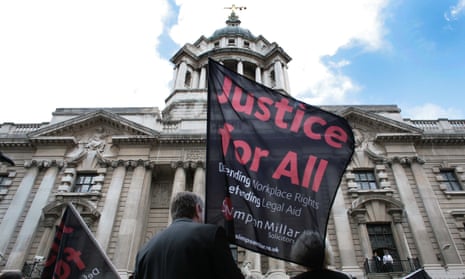Criminal defence solicitors may become extinct in parts of England and Wales within five years, due to cuts to legal fees that have rendered the profession unprofitable, according to the Law Society.
The strongly worded warning comes as barristers have begun refusing to take on legal aid cases and are planning mass walk-outs in protest at what they say is sustained under-funding of criminal trials.
The suggestion that defendants could soon be left unrepresented highlights the crisis of confidence in the criminal courts as even the lord chief justice, Lord Burnett of Maldon, complained in a speech on Monday about under-investment.
More than 80 barristers’ chambers have now publicly backed the boycott of new legal aid cases and a Vigil for Justice demonstration, organised by the Justice Alliance, is to be held outside the Ministry of Justice on Wednesday 18 April.
Data unveiled by the the Law Society, which represents solicitors across England and Wales, shows those specialising in criminal work are an increasingly ageing cohort, with few lawyers joining the relatively poorly paid branch of the profession.
“The justice system is facing a cliff-edge scenario; criminal duty solicitors are part of an increasingly ageing profession, and government cuts mean there are not enough young lawyers entering the field of criminal defence work,” said the Law Society president, Joe Egan.
“If this trend continues, in five to 10 years’ time there could be insufficient criminal defence solicitors in many regions, leaving people in need of legal advice unable to access their rights.”
In Dorset, Somerset, Wiltshire, Worcestershire, West Wales and Mid Wales, more than 60% of criminal law solicitors are aged over 50, the survey found. “The data shows that criminal duty solicitors are becoming extinct,” the Law Society said.
In Norfolk, Suffolk, Cornwall and Worcestershire there are no criminal law solicitors aged under 35 who are practising. A map shows the ageing profile of criminal solicitors across England and Wales.
The Law Society is concerned these trends may have a “catastrophic effect” on the criminal justice system, as criminal defence solicitors retire and leave a shortage of experienced practitioners.
Everyone has the right to free legal advice if they’re questioned at a police station. Advice given in a police station is not means-tested but the number of duty solicitors available to give advice is declining. In Southport, for example, there are only two duty solicitors, in Kendal and Windermere only one and in Hinckley, Leicestershire, just three.
From May 2014 to January 2018 the overall number of practising solicitors rose by 7.8%, but the proportion specialising in criminal work fell by 9.4%.
“Twenty years without any increases in fees, and a series of drastic cuts, have pushed the criminal justice system to the point where lawyers can no longer see a viable career doing this work,” Egan said. “If a suspect cannot access free advice and representation, a fair trial would be jeopardised, and cases would collapse.”
The government, he said, should “conduct an economic review of the long-term viability of the criminal legal aid system and ... guarantee that criminal legal aid fees will rise with inflation”.
In separate comments about the need to modernise the justice system, Lord Burnett said: “We know that many of our buildings are in a poor state. There has been over a decade of under-investment in maintenance, amounting to neglect. I have seen for myself the leaking roofs, broken lifts, faltering or broken heating systems, overflowing lavatories and much more.
“At the heart of many of the things that have led to an attrition of judicial morale are questions of resources. For many things – pay and pensions, investment in the estate – we depend on government, and on those I shall continue to press our cause.”
The Ministry of Justice said: “We are clear that we have enough solicitors to fulfil criminal cases and will make sure we continue to do so.
“Last year, we spent £1.6bn on legal aid, just over a fifth of the Ministry of Justice’s budget. This ensured legal support was available to those who most needed it - and this will remain the case.
“We are already working closely with partners in the legal system to review the changes we made to legal aid in 2012, to make sure they are delivering the efficiency and fairness we need.”










